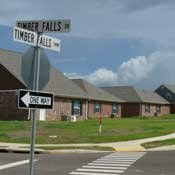The developer of a south Jackson housing development is asking Hinds County to support infrastructure developments, but at least one supervisor remains skeptical of the request.
Clarence Chapman, principal of Oxford-based Chartre Consulting, appeared before the Board of Supervisors July 15 to discuss his request for tax increment financing, or TIF funds, for infrastructure around the Timber Falls subdivision.
The project's first phase, now complete, consists of 325 single-family homes, which Chapman is leasing with an option to purchase at a reduced price after 15 years. Chapman used low-income housing tax credits to help fund the project, a method that he described as "using what in a lot of areas has been distasteful funding for very tasteful purposes."
The homes have two-car garages and other amenities not commonly associated with affordable housing. All the homes have occupants, and there is a 300-person waiting list, Chapman said.
Chapman is asking the county to help fund a straightening and extension of Forest Hill Road and an extension of Raymond Road to the development, along with accompanying sidewalks and water and sewer lines. The work would carry a total price tag of $3 million, Chapman said. He is asking the county for roughly half that total, with the other half coming from the city of Jackson.
The Jackson City Council approved funding for the project in December 2009.
At Thursday's work session, Chapman did not provide a specific estimate of the county's contribution. Chapman hopes to bring a final TIF proposal to the board
next month.
Supervisor Peggy Calhoun appeared skeptical of Chapman's request, warning of the TIF's cost to taxpayers.
Under the TIF agreement, the county would pledge a portion of the increased property-tax revenues the development generates for 20 years. Chapman's firm would use those estimated tax increases to secure bonds to finance the infrastructure work. For most TIFs, the county typically pledges 50 percent of the increase in its general property-tax revenue, but Chapman hopes the county will contribute a greater percentage.
"We're asking for more since we have already put this tax base on the ground, and it's going to help create the other bigger parts of the development," Chapman said. "And they have been up to 80 percent on the King Edward Hotel."
Chapman emphasized that his TIF request relied on improvements that were already complete, unlike many developers, who ask municipalities to commit TIF funds based on the anticipated value of improvements.
Chapman acknowledged that he would likely ask the county for additional TIF help with later phases of Timber Falls, which would ultimately include over 1,000 market-rate houses and commercial development.
Calhoun told the JFP after the meeting that she wanted to ensure that the board received clear information from Chapman's firm."They gloss over everything with cream and sugar," Calhoun said.
Calhoun said that conversations with homeowners in the area suggest that crime is a bigger problem in the development than Chapman is acknowledging. "They do have their share of problems," she said.
At the work session, Calhoun also argued that Chapman did not pay a fair tax rate on his tax-credit development. A TIF would further reduce the state's county collections, she suggested.
Calhoun's comments referred to a loophole in state law that requires county tax assessors to use only one method, called the "income approach," to determine the value of affordable housing developments. This limited approach has left counties with low collections from affordable housing properties, said Steve Gray, director of governmental affairs for the Mississippi Association of Supervisors.
"These are multi-million dollar complexes that basically are not paying anything (in taxes)," Gray said. "It's hitting a lot of the counties' budgets right now.
This year, MAS lobbied for House Bill 301, which would have allowed tax assessors multiple methods of determining property value for affordable housing. As a concession to developers, it also would have made the first 35 percent of the assessed value of affordable housing projects non-taxable.
Calhoun's husband, Rep. Credell Calhoun, D-Jackson, voted for the legislation, along with all but three members of the House of Representatives. The measure died in the Senate Finance Committee, however, when Chairman Dean Kirby, R-Pearl, demanded that it meet the approval of developers.
Chapman said that Calhoun's objection to the tax rate for affordable housing was both wrong and irrelevant.
"They're being taxed fairly now," Chapman said. "There may be a modification of the law, but it'll have to be fair or it won't be constitutional. That's a long, drawn-out rat-killing that hasn't got anything to do with this. They want to tax tax-credit housing as market-rate rental, which is absurd."
Nevertheless, Calhoun said that she was willing to consider voting for the TIF if the county was assured of receiving some portion of the increased property tax revenues from the development.
"They are doing some good things," Calhoun said. "Nobody's against affordable housing for anyone."



Comments
Use the comment form below to begin a discussion about this content.
comments powered by Disqus